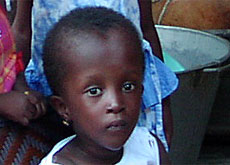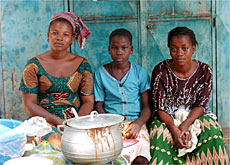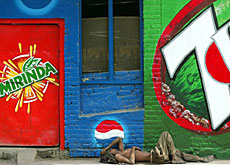Swiss project offers gateway to modern medicine

Six-year-old Fanta lives with her parents and siblings in a crude concrete house in the Malian capital of Bamako.
She is one of the tens of thousands of babies who are born in Mali each year with congenital hydrocephalus – a treatable condition commonly known as “water on the brain”.
Shortly after her birth, a traditional medicine man told Fanta’s parents that her illness was incurable and that she would be “better off dead”.
But thanks to a telemedicine project between Geneva’s University Hospital and a handful of Malian hospitals, Fanta is alive today.
“A charlatan said she was the child of the devil and told us to throw her into the River Niger,” Fanta’s father, Sidi Yaya Camara, told swissinfo.
“But I knew this couldn’t be true, so I contacted different organisations until I found someone who took pity on me and helped us get in touch with doctors in Geneva,” he added.
Remote examinations
Doctors in Switzerland evaluated Fanta’s condition via a “teleconsultation” process over the internet, using video and email exchanges.
She was later flown to Geneva, where neurosurgeons placed a shunt in her brain to divert the flow of excess cerebrospinal fluid that would have eventually killed her.
Five years later, Fanta’s head is still abnormally large due to the swelling of her brain when she was a baby and it is unlikely that she will ever walk or go to school.
But when asked whether he believes he did the right thing in prolonging her life, Fanta’s father points to his daughter – who sits nearby softly humming a nursery rhyme – and says he “couldn’t imagine life without her”.
“She will face difficulties, that’s for sure, but she’s very intelligent and like all children, she deserves the best chance in life that we can give her,” he said determinedly.
Improving care
Fanta’s story is a prime example of how information and communication technologies (ICTs) can increase knowledge sharing between doctors in developing and industrialised countries.
In places like Switzerland, congenital hydrocephalus can usually be detected before a baby is even born and successfully treated immediately after birth.
But in a country like Mali – where the ratio of qualified doctors to patients is 1: 13,000 and the infant mortality rate hovers at around 14 per cent – cases like Fanta’s are not uncommon and often go untreated.
“Our goal is to use technology to help develop the health systems in these countries,” the head of medical informatics at Geneva University, Antoine Geissbuhler, told swissinfo.
“We’re trying to do this by improving continuing medical education and by helping to deal with specific patients through teleconsultations,” he added.
Distance learning
Started three years ago, the telemedicine project with Mali – known in the local language as “Keneya Blown” or health gateway – has been used to diagnose dozens of complicated cases in the country.
The network, which is expected to expand to 12 West African nations by the end of 2005, also uses video-conferencing, email and the internet to provide continuing medical education for hundreds of doctors across Mali.
In addition, Swiss physicians have been able to seek expert advice on rare tropical diseases from their Malian counterparts via the system.
The project is expected to have an especially large impact on rural areas of West Africa, where medical care and facilities are often non-existent due to a lack of infrastructure and training.
But Keneya Blown’s coordinator in Mali, Oumar Bagayoko, points out that efforts must be made to respect the local knowledge associated with widely practised rural and traditional medicine.
“This type of treatment and care does have its merits, despite the misguided advice Fanta’s parents were given,” he told swissinfo.
“But it needs to be updated in order to distinguish remedies that actually work from foolish and dangerous beliefs… hopefully, we can achieve this by educating professionals and the public.”
swissinfo, Anna Nelson in Bamako, Mali
Of the 11.3 million people living in Mali, roughly 70 per cent survive on less than a dollar a day.
The average life expectancy in the country is 40.9 years and about a quarter of all children will die before their fifth birthday.
There is only one qualified doctor for every 13,000 people in the country and health care in remote areas is virtually non-existent.
As a result, the vast majority of Malians turn to traditional medicine, which experts believe has many merits but can sometimes result in misguided treatment and advice.
Tens of thousands of children and adults die each year in impoverished countries like Mali of preventable and curable diseases.
A severe shortage of qualified doctors, as well as a lack of modern medical facilities and continuing education, are mainly to blame for the poor quality of health care in Mali.
But a telemedicine project between the University of Geneva and Malian hospitals has shown that ICTs can dramatically improve the exchange of information and expertise between doctors in developing and industrialised nations.
The network – which is expected to expand to 12 West African nations by 2005 – uses video-conferencing, email and the internet to diagnose diseases and provide continuing medical education for hundreds of Malian doctors.

In compliance with the JTI standards
More: SWI swissinfo.ch certified by the Journalism Trust Initiative


You can find an overview of ongoing debates with our journalists here . Please join us!
If you want to start a conversation about a topic raised in this article or want to report factual errors, email us at english@swissinfo.ch.